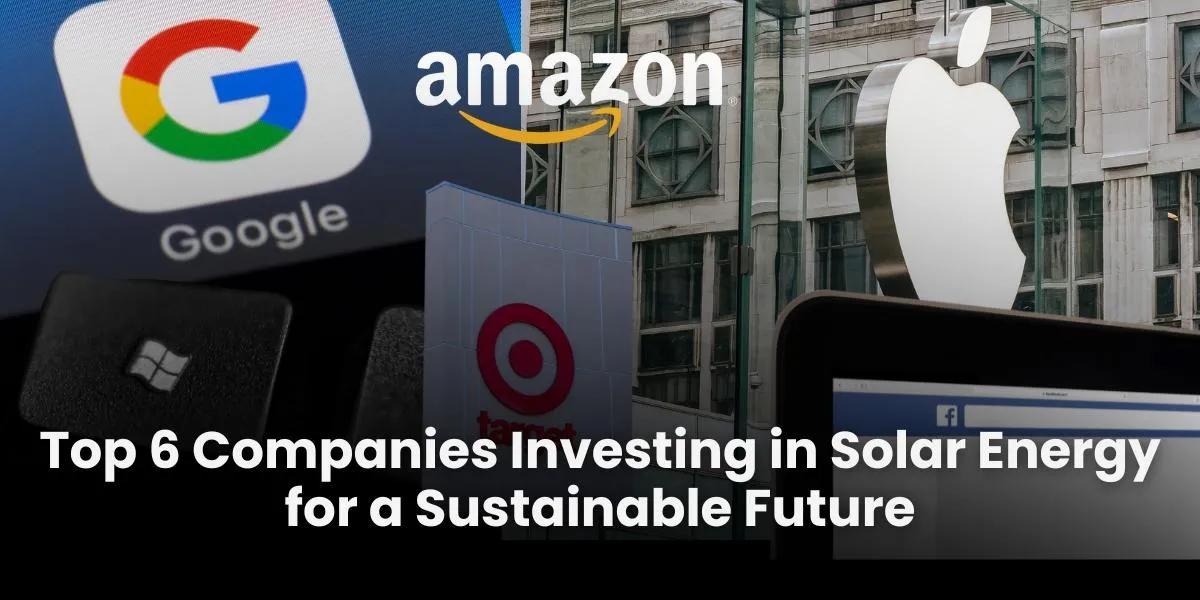BLOG ARTICLES
MY SOLAR SOLUTIONS BLOG

Top 6 Companies Investing in Solar Energy for a Sustainable Future
In a world grappling with climate change, solar energy has stepped into the limelight as a champion for sustainability. Top global companies are taking massive strides in adopting this renewable energy source, not just for their green goals but to power an eco-friendlier future.
Let's dive into the inspiring solar energy commitments of six leading industry giants and uncover how they're driving the charge towards a sustainable tomorrow.
Major corporations are increasingly investing in solar energy, not just as a nod to environmental responsibility, but primarily because it significantly enhances their bottom lines. By adopting solar power, these companies are able to slash their energy costs, often securing a stable and predictable energy supply at a fraction of the price of traditional power sources. Additionally, investments in solar infrastructure can yield substantial tax benefits and incentives, further driving down expenses. Over time, the reduced operational costs and long-term savings on energy expenditures provide a competitive edge, enabling them to reallocate funds toward growth initiatives, innovation, and other profit-generating activities. This financial prudence aligns with their strategic goals and demonstrates that sustainable practices can coexist with robust economic performance.
#1 Amazon
Goals and Achievements
Amazon leads the renewable energy race. The e-commerce giant aims for 100% renewable energy operations by 2025, surpassing its initial target by five years. By 2021, they had already hit 85% renewable energy across their business.
Global Solar Initiatives
Amazon's global footprint in solar energy is commendable. They've launched projects in places like South Africa, UAE, Singapore, and Australia.
Electric Delivery Vans
Amazon's push for sustainability includes over 5,000 electric delivery vans, reducing carbon emissions on the ground. Rivian’s vans have delivered over 150 million packages in the U.S., showcasing tangible progress.
#2 META Platforms, Inc: Battery Integration
Renewable Energy Contracts
META isn't just a social media giant; they're a green energy leader too. With over 9,000 megawatts (MW) of solar and wind energy contracts worldwide, META is making waves in renewable energy.
Data Center Energy Savings
The rise of remote work is leading to an increase in the number of data centers being built. META stands out for its creative integration of solar power, a move that not only boosts energy efficiency in these centers but also drives down operational expenses while lessening their environmental footprint. This conscious effort aligns with the growing trend towards sustainable and eco-friendly practices in the business world.
Innovative Energy Storage
META showcases their foresight with 50 MW of battery storage near its Los Lunas data center, part of a total of 130 MW of battery energy storage deployed across the U.S.
#3 Apple: Supplier Clean Energy Program
Decarbonizing Operations
Apple’s Supplier Clean Energy Program has successfully attracted more than 40 manufacturing partners within a span of one year. This collective effort is significantly contributing to Apple's commitment to achieve a carbon-neutral operation by the year 2030.
Global Impact
In 2021, Apple and its suppliers avoided a staggering 17.4 million metric tons of carbon emissions, akin to taking nearly 3.8 million cars off the road.
Supplier Initiatives in the U.S.
Apple’s push includes 27 U.S. suppliers achieving 100% renewable electricity, showcasing Apple's commitment to genuine change through collaboration and innovation.
#4 Walmart: Committed to Global Goals
Solar Energy Integration
Walmart has set a goal to transition all its facilities worldwide to operate using 100% renewable energy by the year 2035. Furthermore, the company aims to reach a point where it produces zero emissions by the year 2040.
Retail Impact
Imagine visiting a store powered by the sun: more than 7.2 million people experience this weekly at Walmart, highlighting the widespread impact.
#5 Microsoft: Carbon Negative Goals
Collaborations and Projects
Microsoft collaborates with global leaders to secure over 2.5 gigawatts of solar energy capacity. This can power over 400,000 homes, underlining their massive commitment.
Domestic Production Support
By supporting U.S. production of solar components, Microsoft is diversifying the energy supply chain, fostering resilience, and promoting sustainability.
#6 Target: Net Zero Ambitions
Solar Power in Stores
Target's green efforts include rooftop solar panels on 500 locations by 2020, aiming now for 100% renewable electricity in their U.S. operations.
Beyond Rooftop Installations
By entering new solar contracts, Target plans to meet over 50% of its electricity needs with renewable energy, demonstrating their broadened horizon in green energy.
Leading by Example
The top six companies investing in solar energy - META, Amazon, Apple, Walmart, Microsoft, and Target - are spearheading the movement towards renewable energy. Their commitments, from solar panel installations to innovative battery storage solutions, are more than just corporate goals; they’re beacons guiding us to a sustainable future.
As these giants lead the way, we must all pick up the mantle, pushing for a greener tomorrow. Every company, big or small, has a role to play. Together, we can light up the world with the power of the sun.
FAQs
Why are companies investing in solar energy?
Companies invest in solar energy to reduce their carbon footprint, meet sustainability goals, and lower operational costs long-term.What are the benefits of solar energy for businesses?
Solar energy can reduce electricity bills, offer energy independence, provide positive brand image, and contribute to environmental sustainability.How does Amazon's electric delivery fleet impact sustainability?
Amazon's fleet of electric vans drastically reduces carbon emissions from deliveries, showcasing a practical application of renewable energy.What is the significance of Apple’s Supplier Clean Energy Program?
Apple's program encourages suppliers to adopt renewable energy, amplifying the impact and scale of sustainability efforts across its supply chain.How do data centers benefit from solar energy?
Solar energy helps data centers reduce energy costs, minimize carbon emissions, and ensure a stable energy supply, essential for their round-the-clock operations.

